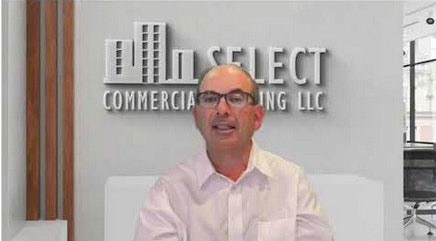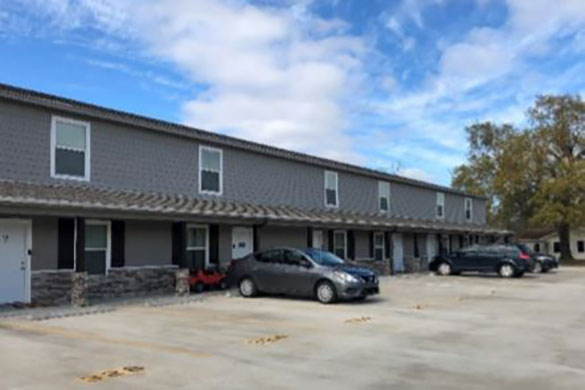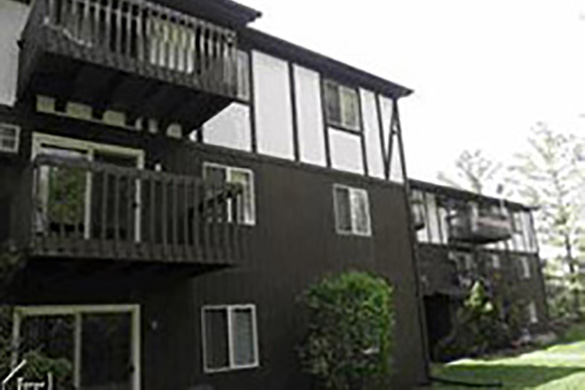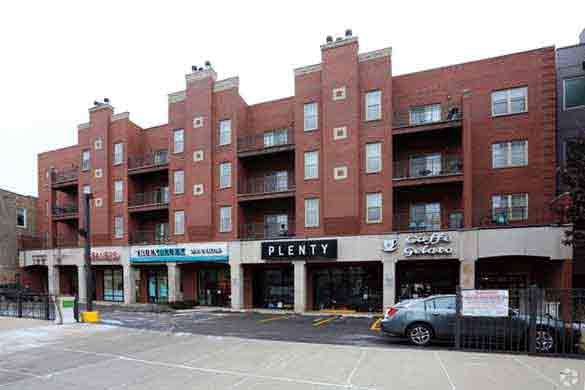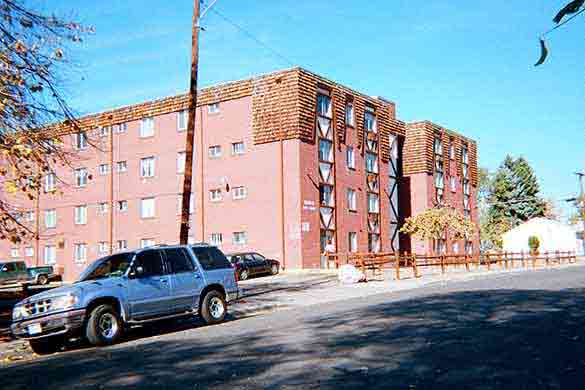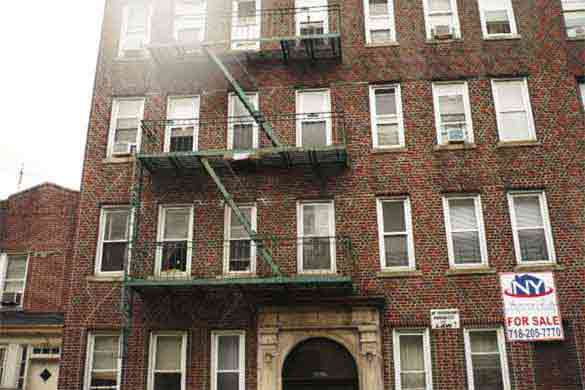Connecticut Apartment Loan Rates
| CT Apartment Loan Rates Greater Than $6 Million | Free Loan Quote | ||
|---|---|---|---|
| Loan Type | Rate* | LTV | |
| Apartment Loan 5 Yr Fixed | 5.18% | Up to 75% | |
| Apartment Loan 7 Yr Fixed | 5.23% | Up to 75% | |
| Apartment Loan 10 Yr Fixed | 5.30% | Up to 75% | |
| CT Apartment Loan Rates Less Than $6 Million | Free Loan Quote | ||
|---|---|---|---|
| Loan Type | Rate* | LTV | |
| Apartment Loan 5 Yr Fixed | 5.58% | Up to 80% | |
| Apartment Loan 7 Yr Fixed | 5.63% | Up to 80% | |
| Apartment Loan 10 Yr Fixed | 5.70% | Up to 80% | |
*Rates start as low as the rates stated here. Your rate, LTV, and amortization will be determined by underwriting.
Want a personalized quote? Click here to request a customized loan quote for your Connecticut apartment property.
Need a multifamily loan over $6 million? Visit our Connecticut multifamily loan page. For other commercial property types, explore our Connecticut commercial mortgage options. To compare all rates nationwide, see commercial mortgage rates.
Connecticut Apartment Market Snapshot (2025)
Average Rent by Metro Area:
- Bridgeport-Stamford-Norwalk: $2,320
- Hartford-West Hartford-East Hartford: $1,630
- New Haven-Milford: $1,895
- Norwich-New London: $1,565
- Statewide Average: $1,850
Vacancy Rates (2025):
- Bridgeport/Stamford: 5.5%
- Hartford Metro: 5.9%
- New Haven: 6.4%
- Statewide Average: ~5.9%
Key 2025 Trends:
- Steady rent growth, averaging 2.2% annually statewide.
- Apartment building loan demand strongest in Fairfield County and Greater Hartford.
- Apartment lenders are reporting more applications for suburban and transit-oriented developments.
- Apartment financing terms remain attractive, with cap rates averaging 5.8%.
Why Choose Select Commercial for Apartment Loans
What sets Select Commercial apart from traditional lenders and large banks? In this short video, we highlight the key reasons apartment building investors choose to work with us for Connecticut apartment loans between $1.5 million and $6 million. We also actively finance multifamily loans exceeding $6 million.
Here’s what the video touches on:
- No upfront application or processing fees
- Fast written pre-approvals often within 24 hours
- Access to a wide range of apartment lenders, not just one bank
- Loan structures tailored to your property and investment goals
What Lenders Look for in a Connecticut Apartment Loan
Before you apply for a Connecticut apartment loan, it helps to understand what lenders are actually evaluating. In this short video, Select Commercial President Stephen Sobin outlines the key borrower and property qualifications that influence approval.
Watch to learn:
- What makes a loan request stand out or get rejected
- The importance of cash flow, occupancy, and borrower experience
- Which documents lenders require to issue a pre-approval
Understanding Your Apartment Loan Options
Not all apartment loans are created equal. In this short video, Stephen Sobin explains the most common types of apartment loan programs and when each one makes the most sense for Connecticut borrowers.
- Bank vs. agency vs. private apartment lenders
- Short-term vs. long-term fixed-rate options
- How to structure your loan based on your property and investment goals
Our Apartment Loan Application Process
We make applying for a Connecticut apartment loan fast, clear, and cost-effective. Below is a step-by-step overview of what to expect when working with Select Commercial:

Step 1: Initial Screening
During an introductory call or email, we gather the basics of your transaction. If the request doesn’t meet loan guidelines, we’ll let you know right away.

Step 2: Document Request
If eligible, we’ll send a short checklist to review your financials, credit, and property cash flow. This includes tax returns, rent rolls, and operating statements.

Step 3: Underwriter Review
Once documents are received, underwriting begins. If your deal qualifies, we issue a written pre-approval. If not, we’ll explain why.

Step 4: Pre-Approval Letter
If approved, we send you a detailed pre-approval letter outlining preliminary terms and any additional requirements.

Step 5: Third-Party Reports
Once pre-approved, the underwriter orders the appraisal and any necessary third-party reports. A good faith deposit is required to cover these costs.

Step 6: Final Submission
When all documentation and reports are in, we finalize underwriting and issue a formal loan commitment.

Step 7: Legal & Closing
Our legal team prepares closing checklists and final conditions. Once satisfied, we schedule the closing.

Step 8: Timeline
Most loans close within 30 to 60 days, depending on the complexity of the deal and speed of document delivery.
Apartment Property Types We Finance in Connecticut
At Select Commercial, we arrange financing for a wide range of Connecticut apartment buildings, from smaller 5+ unit walkups to large portfolios of rental properties. Whether your property is urban, suburban, or mixed-use, we can help you secure the right loan structure based on your investment goals.
- Urban mid-rise and high-rise apartment buildings
- Suburban garden-style apartment complexes
- Small apartment buildings with 5+ units
- Mixed-use properties with residential and limited commercial space
- Underlying co-op apartment building loans
- Portfolios of small apartment or single-family rental properties
- Stabilized buildings with strong cash flow and rent history
If you're not sure whether your property qualifies, contact us for a free quote and we'll review your deal and let you know within 24 hours.
Recent Apartment Loan Closings
Why Connecticut Borrowers Choose Select Commercial
Thousands of apartment building investors trust Select Commercial for our direct, transparent approach and proven expertise in the Connecticut apartment loan market. We're not just brokers, we provide personalized service, fast answers, and access to top institutional lenders without the bureaucracy of traditional banks.
- Over 30 years of apartment loan experience with a national platform
- No upfront fees and fast pre-approvals, often within 24 hours
- Direct access to top lenders offering aggressive terms
- Dedicated support from quote to closing
Want to see why so many clients return to us for their next deal? Start with a free quote – we'll review your scenario and respond quickly.
Our Reviews
Latest Expert Insights from Stephen A. Sobin
Stephen A. Sobin, the president of Select Commercial Funding LLC, is a renowned expert in the field of multifamily financing. His insights and perspectives are regularly sought by leading industry publications. Here are his latest contributions that highlight his deep understanding of the multifamily financing landscape and his commitment to providing clear, insightful analysis on key industry issues.
Navigating Opportunity, Risk as 2025 Winds Down
In an article for Commercial Property Executive titled "Navigating Opportunity, Risk as 2025 Winds Down", Sobin explains as we head into the final stretch of 2025, the commercial real estate industry stands at a pivotal moment. After several years of upheaval—from pandemic disruptions to aggressive Federal Reserve rate hikes and lasting shifts in how people live and work—the sector is entering a new phase.
Why Lower Rates Haven't Fixed Commercial Real Estate
In an article for Wealth Management titled "Why Lower Rates Haven't Fixed Commercial Real Estate", Sobin explains that even as the Federal Reserve has begun cutting rates and borrowing costs should be falling, the commercial real estate sector remains locked in a frustrating stalemate. For high-net-worth investors trying to time the market, he emphasizes that understanding this disconnect requires looking beyond the headlines.
Why the Fed Rate Cut’s a Game Changer for CRE
In an article featured in Multi-Housing News, Stephen Sobin highlighted that after months of speculation and market anticipation, the Federal Reserve finally pulled the trigger last week, cutting the federal funds rate by 25 basis points to 4.00 to 4.25 percent. read the full article.
Inflation's Current Impact on Apartment
In an article featured in Multi-Housing News, Sobin explains how commercial mortgage rates continue to challenge investors, with elevated inflation depressing real estate market activity. Read the full article.
Will the July Jobs Report Pressure the Fed to Act?
Sobin noted in Multi-Housing News that unemployment hit a three-year high and job creation slowed significantly, factors that could push the Fed to reconsider future rate hikes. Read the full article.
Persistent Inflation and Its Effects on CRE
In an article featured in Multi-Housing News, Stephen Sobin highlighted that while inflation is still a challenge for the Federal Reserve, there are many positive signs for the commercial real estate industry. The headline Consumer Price Index rose 3.2 percent for the year ended Feb. 29, a figure 20 basis points lower than the Dec. 31, 2023, rate. read the full article.
Commercial Spotlight: Mid-Atlantic Region In this four-state powerhouse, smaller metros are thriving.
In a feature in Scotsman Guide, the Mid-Atlantic Region's real estate dynamics are explored, highlighting its resilience and growth amidst the pandemic.
Stephen Sobin of Select Commercial Funding LLC shared insights on the New York market's allure and the challenges buyers face. He noted the shift from primary urban areas to tertiary markets due to evolving preferences and financial conditions. For a deeper dive into Sobin's analysis, read the full article.
What the New Jobs Report Means for CRE
In an article titled "What the New Jobs Report Means for CRE" in Commercial Property Executive, Stephen Sobin shared his perspective on the latest jobs report and its implications for the Commercial Real Estate (CRE) sector. He highlighted the challenges posed by high interest rates and the prevailing uncertainty in the market. Sobin remarked, "Sellers aren’t selling, buyers aren’t buying... Everyone is waiting because no one knows what to expect." For a detailed analysis and more of Sobin's insights, read the full article.
Decoding "Junk Fees" in Rental Housing
In another latest contribution to Multi-Housing News, Sobin provided expert commentary in an article titled "What's Next for Junk Fees? The Industry Weighs In". He clarified the difference between legitimate fees collected for various third-party services and so-called "junk fees". Sobin emphasized the importance of borrowers understanding their rights in negotiating all loan terms and the obligation of lenders to disclose all fees.
Understanding the Impact of Federal Reserve's Decisions
In a recent article titled "How the Fed's Pause on Interest Rates Impacts Multifamily" published by Multi-Housing News, Sobin shared his expert insights on the Federal Reserve's decision to pause interest rate hikes. He accurately predicted that the Fed would not raise rates in June, citing recent bank failures and lingering concerns about a potential recession.
Stay tuned for more expert insights from Stephen A. Sobin on the evolving multifamily financing landscape.
Frequently Asked Questions About Connecticut Apartment Loans
Connecticut apartment loan rates vary depending on several factors such as loan-to-value ratio (LTV), property type, borrower experience, and market conditions. As of 2025, rates remain elevated due to ongoing inflation concerns, but borrowers with strong credit and high-quality assets can still find competitive pricing. Check our latest apartment loan rates for current updates.
Most lenders require a DSCR of at least 1.25, good borrower credit, net worth, liquidity, and experience. Loan-to-value ratios in 2025 typically range from 65% to 80%, due to elevated interest rates. Properties with strong occupancy and clean financials stand a better chance of qualifying.
Most lenders require 20% to 25% down for apartment loans in Connecticut. Your loan-to-value ratio will be subject to the property's debt service coverage ratio.
A qualified broker like Select Commercial can present your loan to many different capital sources, including banks, credit unions, CMBS, agency lenders, and private funds. This increases the odds of approval and helps you secure the most favorable terms available.
The process starts with gathering financials like a rent roll, trailing 12-month income and expense statement, borrower resume, and net worth statement. A mortgage broker will analyze your documents and match you with the best lending program. Start with a Free Quote today.
Absolutely. While this page focuses on apartment loans under $6 million, Select Commercial also arranges smaller balance loans for qualified borrowers. Visit our multifamily loan page for options over $6 million.
Agency Small Balance Apartment Loan Programs
Select Commercial connects borrowers with top-tier agency small balance loan programs in addition to bank and private capital options. Featured programs include:
- Fannie Mae® Small Loan Program – For apartment properties with 5+ units and loan sizes from $1 million to $6 million
- Freddie Mac® Small Balance Loan (SBL) Program – Streamlined financing solutions up to $6 million
- Loans Over $6 Million – Explore large-balance apartment loan programs in Connecticut
These agency-backed options offer competitive fixed rates, non-recourse terms, and simplified underwriting for qualified apartment investors.
Connecticut Apartment Building Financing
Select Commercial provides apartment building financing and Connecticut commercial mortgages throughout the state of Connecticut including but not limited to the areas below.


